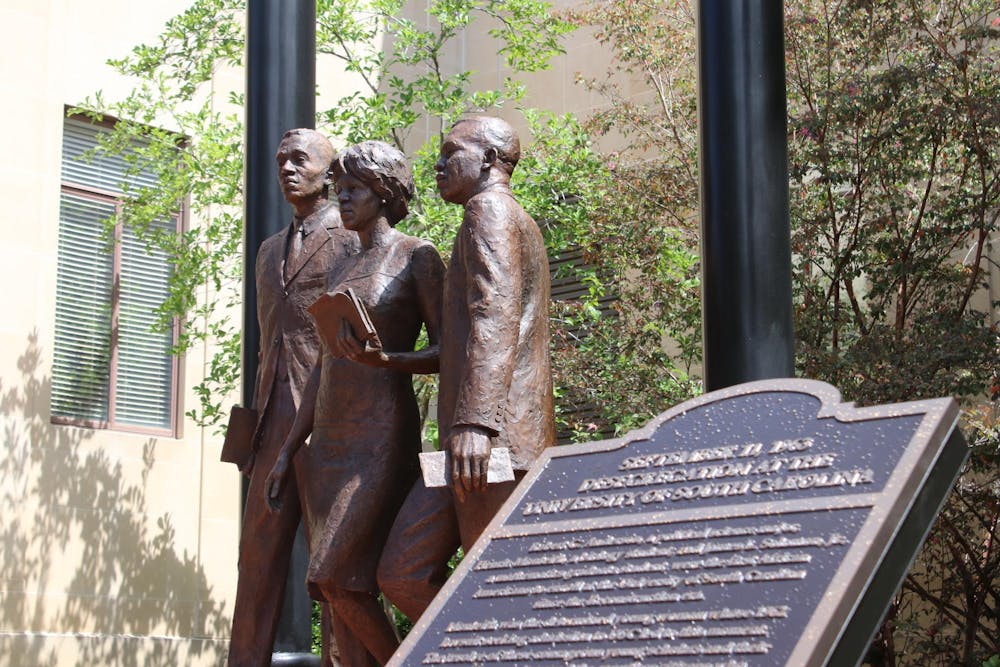The University of South Carolina unveiled a new monument on the Horseshoe on Friday, which commemorates the 60th anniversary of the desegregation of the university.
The 12-foot monument depicts Henrie Monteith Treadwell, Robert G. Anderson and James L. Solomon Jr., who were the first three Black students to enroll at USC since reconstruction. It is based on a photograph of the three exiting the Osborne Administrative Building on Sept. 11, 1963.
The board of trustees and sculptor Basil Watson decided to place the sculpture at the crest of the Horseshoe outside McKissick Museum so that every person at the university would see it, board member and former Chairman Dorn Smith said.
“This is the visitor center, where every … man, woman, child that comes on campus to be interviewed at the University of South Carolina is going to walk right past that statue,” Smith said. “They’re going to be able to see it and share it and enjoy it.”
Smith added that the photograph that the statue is based on is "beautiful" and "iconic."
“But it needs to be more visible, where everyone can see it, and I could not be more excited,” Smith said.
The unveiling ceremony hosted Watson, Treadwell, family members of Anderson and Solomon, State Sen. Tameika Isaac Devine (D-District 19) and university President Michael Amiridis.

People gather to take a picture in front of the new desegregation monument on the University of South Carolina Horseshoe after its unveiling on April 19, 2024. The ceremony was attended by students, university faculty, families of the honorees, the sculptor of the monument and the public.
Devine passed a legislative resolution to recognize the three students and the new monument.
“These three students became trailblazers in desegregating the Palmetto state’s flagship university, paving the way to access and educational achievement for many thousands of Black students from South Carolina and beyond who have enrolled at USC for the decades since,” Devine said, reading from the resolution.
The legal process to integrate the university began when Treadwell was 16 years old, Treadwell said. She began the integration process by suing USC after being denied admission.
“I take great pride in knowing that in some small way, 60 years ago, I legally opened a door,” Treadwell said. “Or, as Congressman John Lewis would say, I got in the way of a policy, of a tradition, that had passed its time.”
The details of the monument represent different ideas of the event it depicts.
“The columns, incomplete and broken as they are, represent the institution and its history and its way forward,” Watson said. “The three Black students look and step ahead as they enter the institution, which is built on the foundation of knowledge, and this is represented by the books in the steps.”
Art like the monument has an important role in our society, Watson said.
“When we invest in art, it is an investment in the promotion of our values and the opening of minds, especially the minds of our young,” Watson said.
The creation of the monument started when Smith brought the idea to the rest of the board, Chairman Thad Westbrook said.
“It’s a special moment for us here at the university to be able to celebrate not only this moment in history, but the three students who bravely stepped out to desegregate the University of South Carolina,” Westbrook said.
The board of trustees oversaw a design and review team that found Watson, Smith said. Since the planning started in 2020, the board and Watson traveled back and forth between Columbia and Atlanta, where Watson is based, before the sculpture found its home on the Horseshoe, Smith said.
“It has been a long journey, two years, working with various stakeholders and partners that came together to create this monument that will stand for generations, heralding the achievements of those who came and sacrificed before us,” Watson said. “It was a team that brought them together on that day, the 11th of September, 1963, and it will be teamwork that will propel us into a better tomorrow.”

